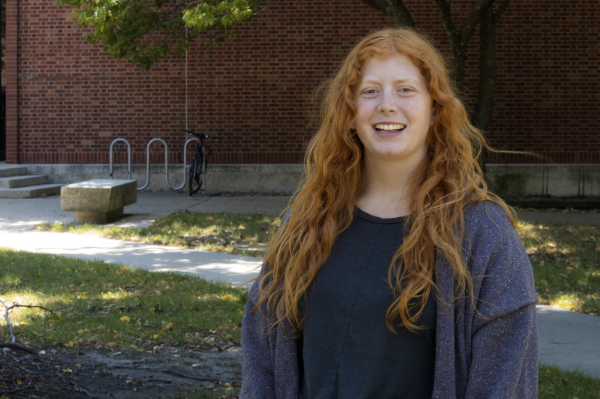On Tuesday, March 28, the Varsity Cinema will be hosting a showing of “Wall-E” at 6:30 p.m. This movie will feature an introduction by Jerrid Kruse, a Professor of Education at Drake University. His lecture will contain various activities to test the attendees’ attention.
“I hope people leave my talk with questions to ask about the movie, but also their own lives and the role of technology in their lives and they get to learn a magic trick,” Kruse said.
“Wall-E” is the second movie in a three-part event called “Science on Screen.” This series features “After Yang,” “Wall-E” and “The Mitchells vs. the Machines,” each opening with a lecture from Drake staff.
The first movie, “After Yang,” is an independent film about a family trying to move on after the AI they bought for their daughter unexpectedly breaks down. Chris Porter, director of the artificial intelligence program and associate professor at Drake University, gave a lecture to accompany the movie.
“You see the role that this AI had played in the lives of these people and the effects of that, so I was thinking about how I could turn that question of what the role of AI in our lives is to the present moment,” Porter said. “Thinking not about how AI can turn against us or how AI can become super intelligent, but how AI is impacting us currently in subtle and invisible ways, so that was the leading question that I explored in the opening remarks of the film.”
According to Porter, his lecture allowed him to present topics he routinely covers in his classes to a wider audience, in a more digestible way. He structured his talk around a paper, “What is Computer Ethics,” and the invisibility factor identified within this paper.
“I asked the audience after having watched the movie, ‘Can you look for instances of the invisibility factor in the movie itself?’ I think that allowed that to sink in a bit more,” Porter said.
Ben Godar, director of a local non-profit arts organization called Des Moines Film, and Dan Chibnall, STEM librarian and associate professor of librarianship at Drake University, worked together to create these showings. They wrote up a proposal for the Science on Screen grant, which was given to them and other movie theaters across the country by the Alfred P. Sloan Foundation to finance these kinds of events.
“The Varsity wanted to build a relationship with Drake. Ben knows film and I know science and science fiction, so he’s like, ‘let’s work on it together,’” Chibnall said. “We put together some ideas for movies and potential speakers, focused on finding folks here at Drake who would be great to talk about the films and we put together the grant. We got the money, and have been showing the films ever since.”
Although not intended at first, all three films are connected through one theme: technology. “After Yang,” “Wall-E” and “The Mitchells vs. the Machines” take on big questions regarding AI and other recent advancement in technology.
“When Ben and I first chose the films, we actually decided that we weren’t going to go with a theme, we were going to try and just go with what we thought were interesting films. And then when we started to work with some of our speakers, we tweaked the films a little bit. That was when we started to realize, hey, this first one’s about AI. “Wall-E” is about technology and AI. Maybe there’s a third film we could also do about this and that’s why the third film that we’re doing in May is ‘The Mitchells vs. the Machines,’” Chibnall said. “With the rise of Chat GPT, and other AI…we thought, this is a home run because people are hearing about AI and advanced tech in the news a lot lately. Let’s reflect that in the films as well.”
Chibnall hopes that Science on Screen attracts Drake University students. Varsity Cinema is located on 25th Street, which is across from Drake’s campus, and students get a $3 discount on tickets. Chibnall explained that this is a unique opportunity to really expand what students learn in the classroom and apply it to real life.
“It’s not just all about, memorize this, understand this skill, learn this technique, right. It’s about how you take what you’re learning in a college classroom and on a college campus and apply it to things that you encounter in everyday life,” Chibnall said. “We don’t just teach STEM here at Drake, we also live it and we experience it.”
Additionally, Kruse said that presenting scientific concepts through films adds both an emotional and motivational aspect to the learning process.
“One of the things we know about learning is that if there is emotion tied to it you learn things better,” Kruse said. “Movies and storytelling add that emotional piece that can really enhance learning.”
Chibnall plans to apply for the grant again in 2024 so this program can continue. He also said they are also considering doing more than three films and want to hear what films students would be interested in seeing.
“We just hope that more and more people come out for the films,” Chibnall said. “We want people to enjoy film, talk about science and listen to some good science people talk about it.”








